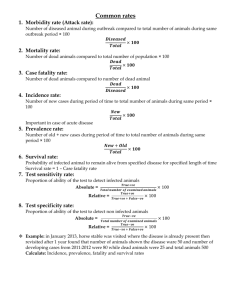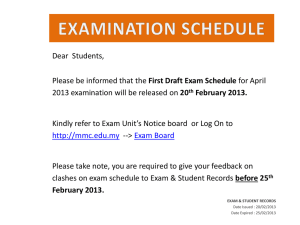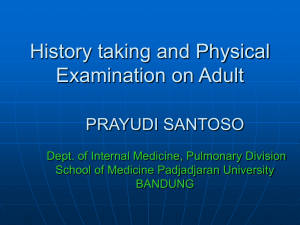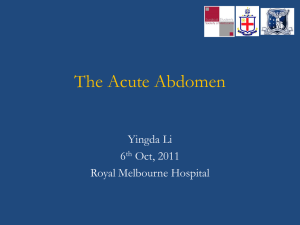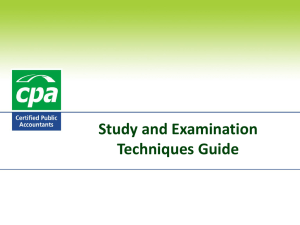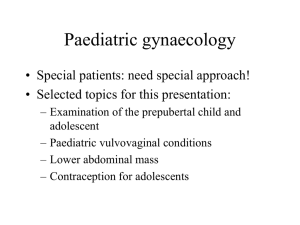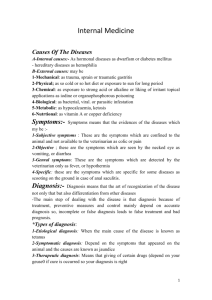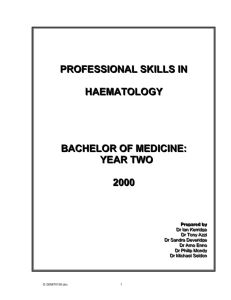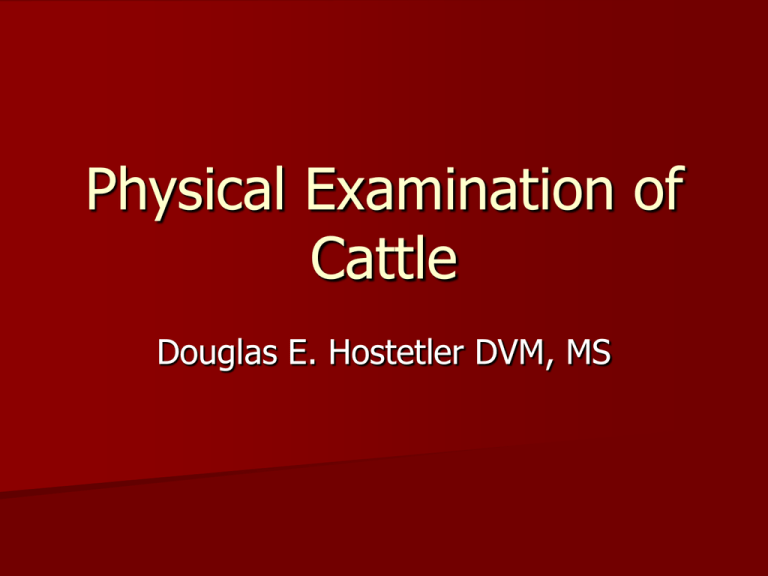
Physical Examination of
Cattle
Douglas E. Hostetler DVM, MS
Indications:
When an individual animal requires
examination to allow diagnosis and
treatment for an illness
Examination of a representative sample of
animals to investigate a herd outbreak of
disease
Evaluation prior to completing health
certificates for intrastate or interstate
transport
Procedure:
Develop a systematic procedure for
performing a complete physical
examination
– Personalized
– Prevents omission of important information
– Enables easier recall of abnormal findings
Dr. Hostetler’s Physical Examination
Observe 1st from a
distance
–
–
–
–
Demeanor
Level of alertness
Responsiveness
Segregation from
herdmates
Not possible in a
referral situation
Visual Observation:
Proprioception
Strength
Lameness
Head and neck
position
Udder symmetry
BCS
Examination:
Restraint
– Chute
– Halter
– Headgate
– Ganglock
Examination:
Collect data most affected by sympathetic
tone first
– Urine Sample for Multistick analysis
– Rumination Rate
– Heart Rate
– Respiratory Rate
Urine Collection:
Gently rub the escutcheon in an upward motion
– Perineal region from udder to Ventral commissure of
the vulva
– Do not hold the tail!
– Collect sample in a clean container
Insert thermometer following urine collection
Some Normal Values
–
–
–
–
pH 8
Glucose Neg
Ketone Neg
Protein Neg-trace
Start on the Left
From the rear forward
Rumination Rate
Listen, count and
record the
primary and
secondary rumen
contractions over
two full minutes
– Mid Left
Paralumbar
Fossa
Normal 1-2 per
Minute
Direct Heart Rate, Rhythm and
Sounds
Left side
– Intercostal
Spaces 3-5
– Behind the
elbow
– Normal
Rate?
48-84
Adults
70-100
Calves
Respiratory Rate and Lung Sounds
Rate can be evaluated
by observation of chest
excursions
– Normal 26-50
Sounds (triangle)
– Point of elbow
– T13 at Transverse
Processes
– Caudal to triceps
Acoustic Percussion
– Dullness Dorsal to the
Heart Shadow?
SQ Emphysema
Dorsally?
– Reach up and feel for
it
Peripheral Lymph Nodes
Prescapular
Prefemoral
Supramammary
Parotid
Submandibular
Superficial Veins
Jugular
– Pulses?
– Distension
Caudal
Superficial
Epigastric
– Distension?
– Swelling?
Abdominal Auscultation and
Percussion
Simultaneous
Auscultation
and
Percussion
– “Pinging”
Entire
Abdomen
Abdominal Auscultation and
Percussion
Simultaneous
Auscultation
and
Percussion
– “Pinging”
Entire
Abdomen
Left limbs and Udder
Swelling of the limbs?
– Fore and Rear
Palpate left quarters of the mammary
gland
– Heat
– Hardness (swelling)
– Edema
– Teat lesions
Proceed to Right Side
Heart Sounds
Right AV
Valve Area
– 3rd to 5th
Intercostal
Space
Murmurs?
Respiratory System
Mirror Image
of Left
Thorax
–
–
–
–
Crackles
Wheezes
No sounds
Emphysema
Peripheral Lymph Nodes
Prescapular
Prefemoral
Supramammary
Parotid
Submandibular
Superficial Veins
Jugular
– Pulses?
– Distension
Caudal
Superficial
Epigastric
– Distension?
– Swelling?
Abdominal Auscultation and
Percussion
Simultaneous
Auscultation
and
Percussion
– “Pinging”
Entire
Abdomen
Abdominal Auscultation and
Percussion
Simultaneous
Auscultation
and
Percussion
– “Pinging”
Entire
Abdomen
Right Limbs and Udder
Swelling of the limbs?
– Fore and Rear
Palpate left quarters of the mammary
gland
– Heat
– Hardness (swelling)
– Edema
– Teat lesions
Collection of Milk
California Mastitis Test
– Relative concentration of somatic sells in the
milk
– 2 ml Milk from each quarter
– Add Reagent
– Look for coagulation
Negative
Trace
1
2
3
http://www.infovets.com/demo/demo/dairy/D100.HTM
Rectal Examination
Reproductive Tract
Female
–
–
–
–
Vaginal wall
Cervix
Uterine Body
Uterine Horns
Oviducts
– Ovaries
Bursae
– Internal iliac lymph nodes
– Sublumbar lymph nodes
Male
–
–
–
–
–
–
–
Intrapelvic penis
Prostate
Seminal vessicles
Ampullae
Internal inguinal rings
Internal iliac lymph nodes
Sublumbar lymph nodes
Rectal Examination
Intra-abdominal
Urinary System
– Left kidney
– Ureters
– Bladder
Rectal Examination
Digestive System
– Right Cranial
Abomasum
– Central
Small intestines
– Left
Rumen
– Dorsal sac
Vaginal Examination
If indicated by the rectal examination or
history
Examination of the Head
Eyes
– Enophthalmus
– Exophthalmus
– Discharge
– Corneal Opacity
– Lenticular Opacity
– Scleral Injection
– Pupillary Light
Response
– Masses
Examination of the Head
Nares
– Discharge
Unilateral/Bilateral
– Plaques
– Erosions
– Hemorrhage/
Epistaxis
– Flaring
Examination of the Head
Oral Cavity
– Dentition
– Erosions
– Vesicles
– Masses
– Blunted Oral
Papillae
Examination of the Head
Cursory Cranial Nerve
Examination
– 1-8
Submandibular Region
– Lymph Nodes
– Edema
Brisket
– Swelling
– Edema
Questions?




